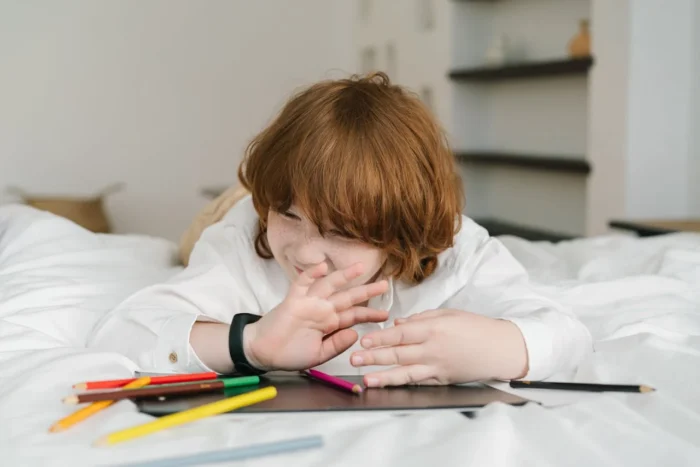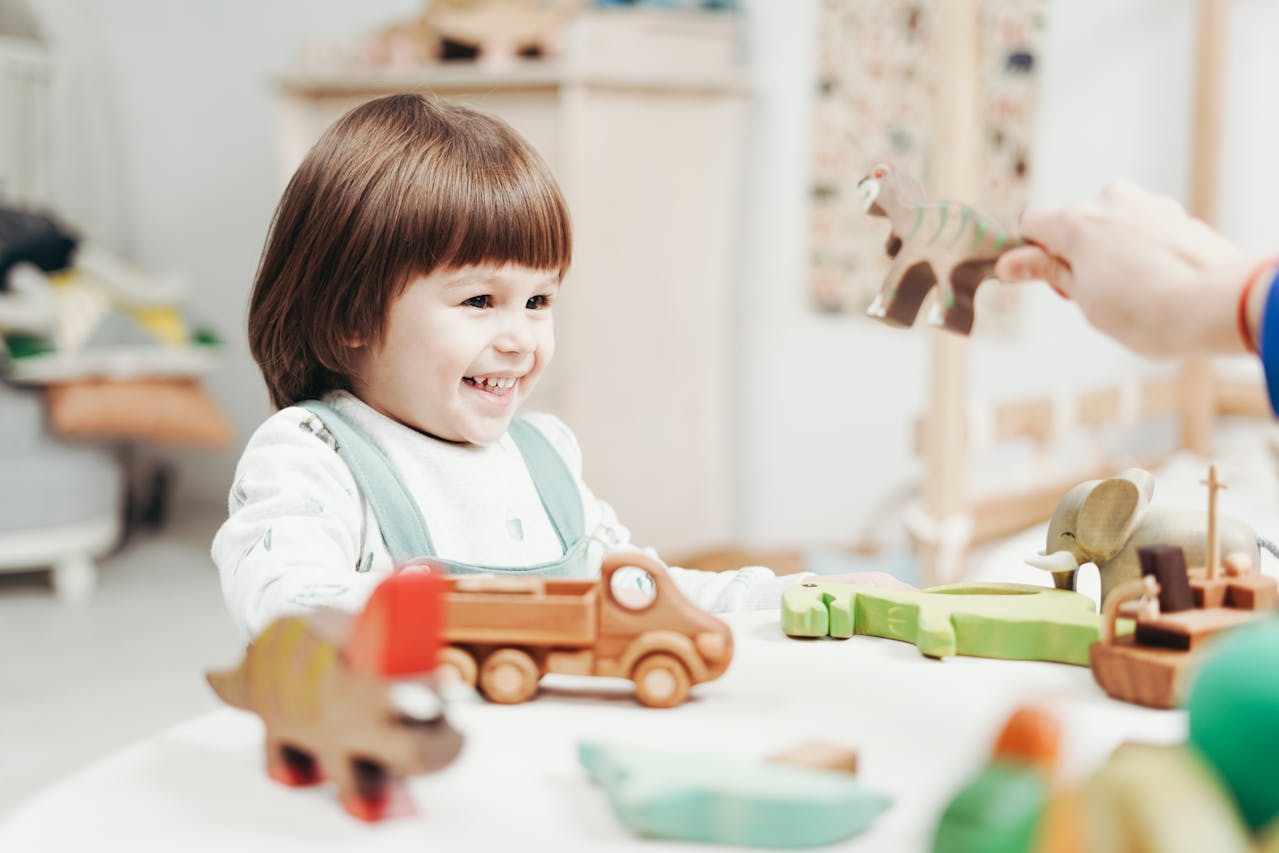
Play is a fundamental part of your child’s growth. Through play, your child learns to communicate, share ideas, express feelings, and understand others — not just with words, but through their actions and expressions. It also allows children to develop an interest in future careers or hobbies, but the best part? You can do it together.
We’ve created a list of 20 fun activities for kids with autism, all of which are meant to support your child’s development.
Let’s play!
Great Activities for Autistic Kids & Families to Enjoy at Home
From quiet, introspective tasks to lively physical games, there’s something here to light up every child’s day. Our selection of free autism activities guarantees your child finds joy, comfort, and challenge in their everyday play.
1. Balancing Beam
Set up a balancing beam using planks of wood or simply tape on your floor. Guiding your child across this beam improves their balance and coordination, and turns a fun challenge into a developmental win. It’s a fantastic way to introduce a bit of playful physical activity into your day.
2. Shadow Puppet Theater
Create cardstock shadow puppets to bring stories to life in your own shadow puppet theater. This activity combines art and storytelling to spark your child’s imagination. It turns storytime into an interactive adventure, perfect for winding down during indoor evenings.
3. Water Play Stations
Set up a water play station filled with various containers, funnels, and toys for those warm, sunny days. This setup is ideal for refreshing summer activities for children with autism, as it encourages endless sensory exploration and provides a sense of calm amidst splashes and laughter.
4. Music Jam Session
Grab some household items and start a music jam session. Discovering sounds, rhythms and dancing together not only fills the room with laughter but also enriches your child’s sensory experiences. Kids living with any type of autism can benefit from music, even those who are nonverbal. It’s a fun way to express their musical creativity, whether solo or with a family band.
5. Garden Together
Simple gardening, such as planting seeds or caring for a small plant, provides a relaxing way to reconnect with nature. This activity also teaches your child about life cycles and responsibility.
6. Create a Sensory Box
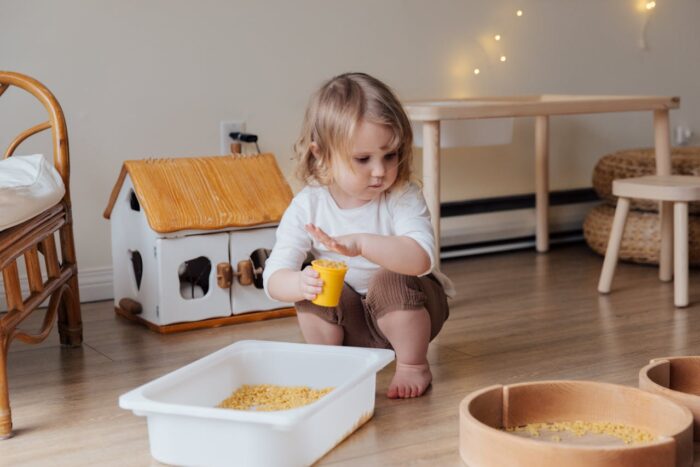
Fill a box with various household items with different textures, such as fabric scraps, rice, or foam pieces. This activity allows your child to explore tactile sensations in the comfort and safety of home.
Sensory activities for kids with low functioning autism are especially beneficial because they provide them with a gentle yet engaging way to interact with their surroundings.
7. Homemade Puzzles
Turn family photos or beloved illustrations from your child’s favorite books into puzzles. Laminate these images, then cut them into pieces. Working on these personalized puzzles together not only sharpens problem-solving skills but also strengthens your child’s connection to familiar images and cherished memories.
Just as visual cues in puzzles help in understanding, they can also make explaining autism to kids clearer by creating a connection to familiar and positive images.
8. DIY Light Box
Make a DIY light box to give transparent and translucent objects a soft, captivating glow. This creative project is an ideal component of indoor activities for an autistic child, as it improves visual focus and discrimination while also turning simple objects into a source of wonder.
9. Themed Treasure Hunts
Set off on an adventure right at home with themed treasure hunts, whether inside or outside. These hunts can infuse your day with excitement and a bit of mystery. Use everyday items as hidden gems and visual cues for guidance, and make sure the themes are appropriate for your child’s interests.
10. Balloon Tennis
Play a lively game of balloon tennis with simple paddles. This game promotes active play, coordination, and healthy turn-taking. It’s a flexible and inclusive group activity that works well for kids with autism.
11. Build with Recyclables
Encourage your child to see the potential in everyday items by crafting with recyclables, such as tubes, cardboard boxes, and containers. This is one of the best activities for kids with autism who enjoy hands-on projects because cardboard creations can range from simple structures to massive forts — a practical and fun lesson in sustainability.
12. Bubble Wrap Path
Transform your floor into a sensory adventure with a path of bubble wrap. Every step and hop results in satisfying pops, which makes this a hit for children who love tactile and auditory feedback. It’s an easy way to turn movement into a game of discovery.
13. Nature Collage Making
On your next walk, collect natural treasures like twigs, leaves, and flowers for a collage. This peaceful activity encourages your child to connect with the natural world and allows for artistic expression.
Making collages can be a serene solo task during a quiet afternoon or a shared group activity, ideal for fostering teamwork and appreciation for nature’s beauty.
14. Interactive Reading Nooks
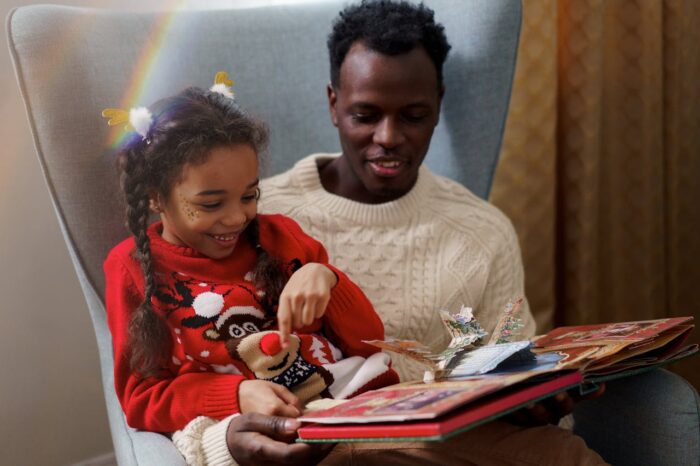
Set up a special corner filled with picture books and objects that bring stories to life through touch and sight. This cozy spot can be a great addition to existing daily activities for your autistic child because it becomes a sanctuary for stories, with each book read together taking them on a sensory-rich journey.
15. Story Cubes
Transform cardboard cubes into engines of imagination by decorating each side with images of characters, scenes, and actions. Tossing these cubes to make up new stories strengthens creativity, language skills, and family bonds. It’s an interactive way to create stories of adventure and mystery together.
16. Sensory Walks
Take your child on sensory walks in the garden, the park, or through different rooms at home, paying attention to the various textures, colors, and smells that surround you. This activity is a practical application of sensory play activities that deepen their connection to the environment and encourage your child to explore and interact with their surroundings in a thoughtful manner.
17. Miniature Worlds
Invite your child to create detailed miniature worlds within shoeboxes or small garden spaces. This activity, whether set in a fairy tale land or a natural setting, fosters storytelling and imagination while developing fine motor skills. It is beneficial for both individual and group activities for children with autism, as it allows for shared stories and creations.
18. Cook Together
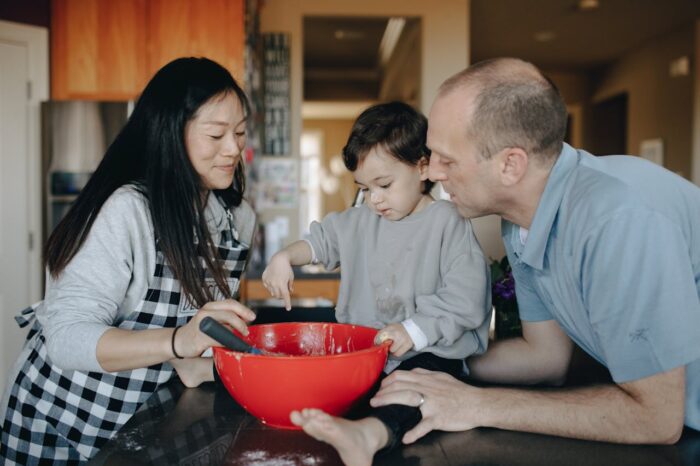
Share the joy of cooking by involving your child in preparing simple meals, like no-bake treats or creative sandwiches. This shared activity teaches valuable life skills while also providing a sensory playground of textures and flavors. When they successfully prepare something tasty, it can boost their confidence and provide them with a sense of accomplishment.
19. DIY Obstacle Courses
Boost your child’s love for movement by creating obstacle courses that match their abilities and spark their curiosity. Guide them to crawl under ropes, leap over cushions, and zigzag around cones. This fun challenge promotes physical growth and encourages problem-solving.
20. Role-Play Scenarios
Role-play scenarios with costumes or puppets can help your child learn about different social situations and emotions. In order to practice and understand complex social dynamics and emotional expressions in a relatable manner, this type of creative play is an essential component of social skills activities for autism.
Selecting the Right Activities for Your Child
Autistic children exhibit different learning styles, so it’s important to adapt play to each child’s specific needs and preferences. Here are some factors to consider when selecting activities that will appeal to your child:
- Start with what inspires them. Whether it’s dinosaurs, space, or music, adapting activities to kids’ interests increases their engagement and joy.
- Incorporate visual aids. Visual cues can simplify understanding and execution of tasks, especially if your kid is a visual learner.
- Choose activities that play to their strengths. If they excel at puzzles, consider complex building sets or coloring books. Also, pay attention to their sensory preferences.
- Keep instructions simple and direct. Break down tasks into manageable steps to avoid overwhelm and encourage independence.
Conclusion
There you have it — the best (and simplest!) activities you can do at home to help your child better understand their surroundings and strengthen your bond. If certain activities don’t resonate as hoped, remember, Abacus Therapies is here to offer additional support.
Have fun exploring these playful moments together!
FAQs
What activities are good for children with autism?
Children with autism find joy and calm in structured activities that blend routine with exploration and creativity. Puzzles, for example, captivate with their complex elements, sensory bins filled with rice or water beads soothe with their textures, and arts and crafts provide them with freedom to express themselves.
What keeps a autistic child busy?
Aligning activities with their passions and strengths keeps autistic children deeply engaged. For instance, mechanically inclined kids can immerse themselves in assembling LEGOs or other building toys. Educational games that make learning interactive spark both fun and development, especially in areas like language and problem-solving.
What things are good for autistic child?
A predictable routine, as well as sensory-friendly toys and items like weighted blankets and noise-canceling headphones, can help children with autism meet their needs for consistency and balance. Also, visual aids such as picture schedules make daily tasks easier.
What are ADL activities for autism?
Activities of Daily Living (ADLs) for children with autism are practical tasks aimed at building independence in personal care and daily chores. These might include dressing oneself using Velcro-fastened clothing, brushing teeth with a step-by-step visual guide, or participating in meal preparation with simple tasks like washing vegetables.

